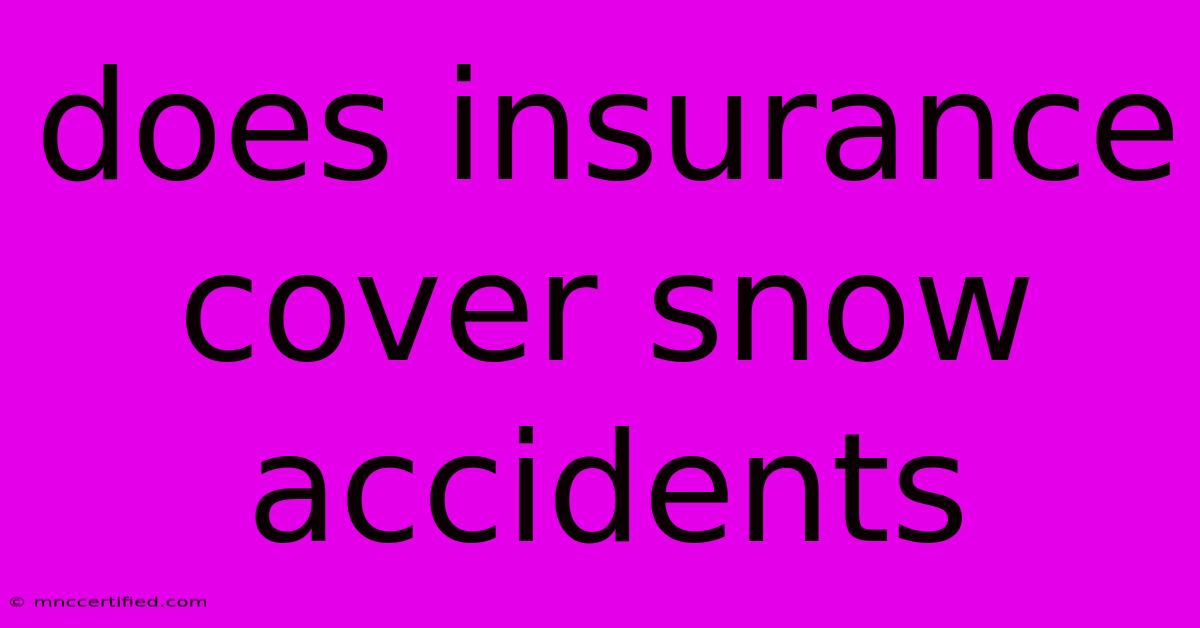Does Insurance Cover Snow Accidents

Table of Contents
Does Insurance Cover Snow Accidents? A Comprehensive Guide
Winter is a time for joy and excitement, especially for snow enthusiasts. However, the snowy landscape can also pose unexpected dangers. So, a crucial question arises: Does insurance cover snow accidents? The answer, unfortunately, is not straightforward. It depends on several factors, including the type of accident, your insurance policy, and the specific circumstances.
Let's break down this complex topic and provide you with a clear understanding of what your insurance might cover in case of a snow-related incident.
Types of Snow Accidents and Potential Insurance Coverage
Here are some common snow accidents and how your insurance might respond:
1. Skiing and Snowboarding Accidents:
- Health Insurance: Most health insurance plans cover medical expenses related to injuries sustained while skiing or snowboarding. This includes emergency care, hospitalization, surgery, and rehabilitation.
- Liability Insurance: If you cause an accident that injures another person, your liability insurance might cover their medical expenses and legal costs.
- Rental Equipment Insurance: Rental equipment insurance can protect you from damage or theft of rented skis, snowboards, or other gear.
2. Snowmobiling Accidents:
- Liability Insurance: As with skiing, liability insurance is crucial for covering damages you cause to others.
- Snowmobile-Specific Insurance: Some insurers offer specialized snowmobile insurance policies that provide comprehensive coverage, including liability, collision, and comprehensive coverage.
3. Snowshoeing and Hiking Accidents:
- Health Insurance: Health insurance covers medical expenses associated with injuries during snowshoeing or hiking.
- Liability Insurance: Your homeowner's or renter's insurance might cover liability claims arising from an accident on your property.
4. Winter Driving Accidents:
- Auto Insurance: Your car insurance will cover damages and injuries resulting from accidents while driving in snowy conditions. This includes collision coverage, comprehensive coverage, and liability coverage.
- Winter Tire Coverage: Some insurance companies offer discounts for using winter tires, which can significantly improve your car's handling in snowy conditions.
5. Slip and Fall Accidents:
- Homeowner's/Renter's Insurance: If you slip and fall on your property, your homeowner's or renter's insurance might cover your medical expenses and legal costs.
- Liability Insurance: If you slip and fall on someone else's property, their liability insurance should cover your injuries.
Key Factors Determining Coverage:
- Your Insurance Policy: Carefully review your policy documents to understand the specific coverage you have for snow accidents.
- Location of the Accident: Coverage may differ depending on the location of the accident, particularly when considering liability claims.
- Circumstances of the Accident: The circumstances surrounding the accident, like negligence, intoxication, or violating safety regulations, can influence your coverage.
Tips for Ensuring Adequate Coverage:
- Review and Update Your Policies: Ensure your insurance policies are up-to-date and cover the specific activities you engage in during winter.
- Consider Additional Coverage: Explore additional insurance options, such as specialized snowmobile or rental equipment insurance, to enhance your protection.
- Read the Fine Print: Understand the limitations and exclusions in your policy, including specific conditions or activities that might affect your coverage.
- Consult with Your Insurance Agent: Discuss your specific needs and concerns with your insurance agent to determine the best coverage for you.
By understanding the nuances of insurance coverage for snow accidents, you can ensure you have adequate protection and enjoy your winter activities with peace of mind. Remember, staying informed about your policies and potential risks is crucial for a safe and enjoyable winter experience.

Thank you for visiting our website wich cover about Does Insurance Cover Snow Accidents. We hope the information provided has been useful to you. Feel free to contact us if you have any questions or need further assistance. See you next time and dont miss to bookmark.
Featured Posts
-
My Chemical Romance The Black Parade Full Show
Nov 13, 2024
-
Tulisa Ends Two Year Celibacy Vow
Nov 13, 2024
-
Commercial Auto Insurance Minnesota
Nov 13, 2024
-
Uwcl Juventus Women Host Arsenal Preview
Nov 13, 2024
-
Denzel Washington Retirement Plans And Black Panther 3 Role
Nov 13, 2024